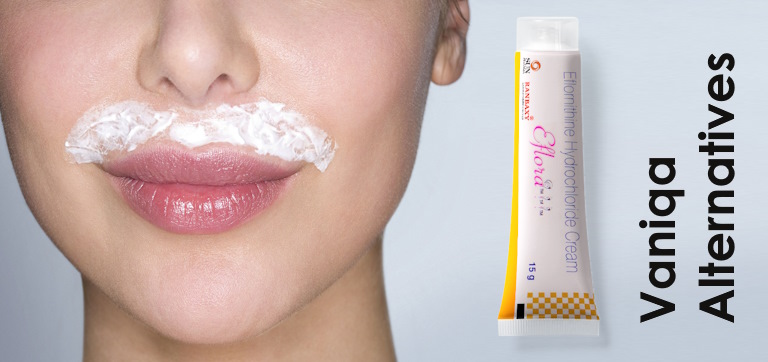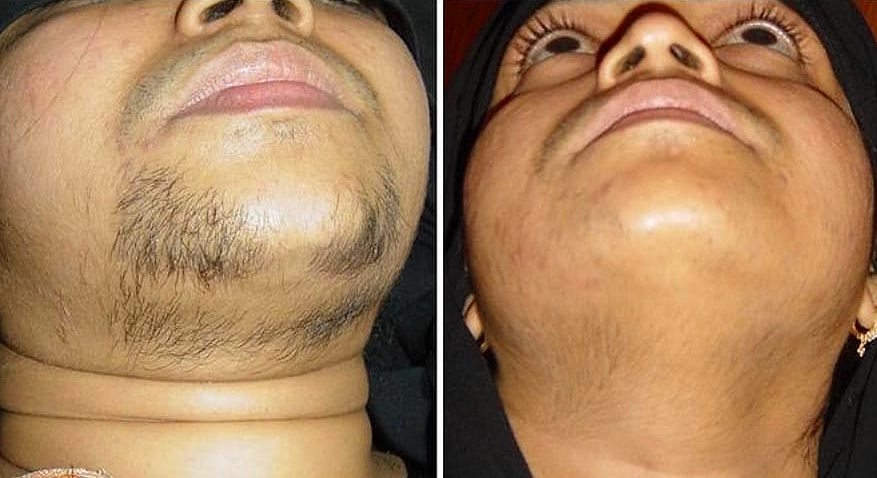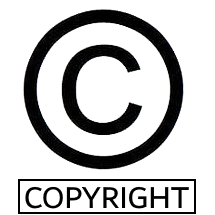Best Vaniqa Alternatives for Facial Hair Removal in 2024
Table of Contents
Facial hair can be a distressing concern for many, often impacting self-confidence. Although Vaniqa Cream has been a preferred choice for managing unwanted facial hair, alternative brands like Eflora Cream are gaining popularity now. The original Vaniqa cream manufactured by SkinMedica has been discontinued but many alternatives are available with the same name. Eflora, similar to Vaniqa, contains the same active ingredient called Eflornithine. While the active ingredient in eflornithine skin creams remains the same, different formulations and manufacturing processes can slightly affect the efficacy of the individual brands.
The active ingredient ‘Eflornithine’ is well-known for its efficacy in reducing facial hair growth. In topical formulations, it targets the hair follicle’s growth enzyme, offering a non-invasive, pain-free method to manage unwanted facial hair. Moreover, it’s suitable for all skin types and ethnicities, making it a versatile option.
As we explore the best alternatives for facial hair removal in 2024, understanding the efficacy, application, and user experiences of products like Eflora Cream is crucial in making an informed choice for your skincare routine.
Understanding Facial Hair Growth: Causes and Impact
Facial hair growth in women, often termed hirsutism, primarily stems from hormonal imbalances. Conditions like Polycystic Ovary Syndrome (PCOS), Cushing’s Syndrome, and certain medications can elevate androgen levels (male hormones), prompting hair growth in areas typically reserved for men, such as the face, chest, and back. Factors like genetics and obesity can also amplify these effects, making some women more susceptible to unwanted hair growth than others.
Beyond the physical aspect, excessive facial hair can profoundly impact one’s psychological well-being. Women with noticeable facial hair often experience social anxiety, reduced self-esteem, and in severe cases, depression. The societal pressure to adhere to certain beauty standards can make facial hair a distressing concern. The journey towards managing hirsutism is not just about aesthetic improvement but also about restoring confidence and psychological comfort.
Eflornithine Skin Cream: The Science Behind
How It Works:
Eflornithine, the active component in creams like Vaniqa and Eflora, operates by targeting the enzyme ornithine decarboxylase (ODC) within the hair follicle. By inhibiting ODC, Eflornithine effectively slows down the rate of hair growth, leading to a noticeable reduction in unwanted facial hair. This process does not completely stop hair growth but significantly decelerates it, making management easier and less frequent.
Clinical Evidence:
Many clinical studies highlight the efficacy of Eflornithine skin cream. A notable study involving 25 women showed significant reductions in hair density, length, and growth rate over 4 months, marking it an effective solution for managing unwanted facial hair (UFH). Furthermore, another trial highlighted Eflornithine’s enhanced effectiveness when used alongside laser therapy, providing a comprehensive approach to managing unwanted facial hair and ensuring patient satisfaction with the results.
Eflornithine Skin Cream: Examining its Efficacy and Suitability
Suitability Across Skin Types:
-
- Broad Compatibility: Well-tolerated by most skin types, including sensitive skin, due to its targeted action on hair follicles.
- Diverse Hair Patterns: Effective for different hair growth patterns, showing marked reduction in both sparse and dense facial hair regions.
Additional Skin Benefits:
-
- Minimized Irritation: Unlike abrasive hair removal methods, Eflornithine cream reduces the need for frequent shaving or waxing, minimizing skin irritation and ingrown hairs.
- Smoother Skin Texture: Regular use can lead to a smoother skin texture as reduced hair growth allows for less mechanical trauma to the skin.
Considerations and Concerns:
-
- Mild Side Effects: Some users may experience temporary redness or mild skin irritation. Usually, these symptoms are transient and diminish with continued use.
- Consistent Application Required: For optimal results, consistent application as directed is crucial. Discontinuation may lead to a return of hair growth to its original state.
Eflornithine Skin Cream stands out for its efficacy, ease of use, and compatibility with various skin types, making it a favored choice in the management of unwanted facial hair.
-
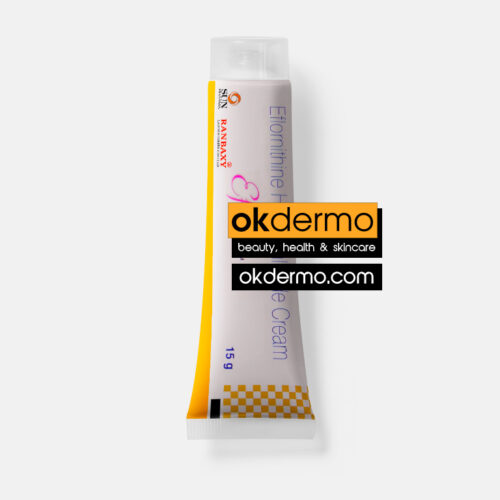
Topical Eflornithine Facial Hair Inhibitor Cream
Eflornithine Hydrochloride 13.9%
Size: 15g / 0.53oz
Brand name: Vaniqa
From USD $42.00 Select options -
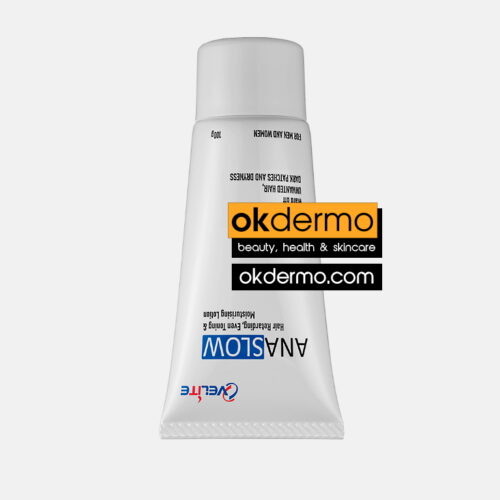
Anaslow® Hair Growth Retarding / Skin Whitening Lotion
Capislow® + Kojic Acid + Niacinamide + Zinc + Vitamin E + Allantoin + Aloe Vera
Brand name: Sederma
Size: 100g/3.5oz
USD $49.00 Add to cart
Eflornithine Cream for Facial Hair: Comparing Alternatives to Vaniqa
The alternative options to Vaniqa cream may vary based on availability in different regions, however, a few notable alternatives given below are worth considering. This comparative overview aims to highlight key differences and similarities to help in making an informed choice.
-
Eflora Cream
-
- Manufacturer: Ranbaxy Laboratories / Sun Pharma
- Concentration of Eflornithine: Typically 13.9%
- Usage: Primarily indicated for reducing unwanted facial hair in women.
- Pros:
- Similar efficacy to Vaniqa in inhibiting hair growth.
- Widely prescribed and recognized as a direct alternative.
- Cons:
- May cause minor skin irritations such as redness or rash.
- Availability – online via OKDERMO pharmacy.
-
Elyn Cream
-
- Manufacturer: Ajanta Pharma
- Concentration of Eflornithine: Usually around 13.9%
- Usage: Designed to slow down facial hair growth in women.
- Pros:
- Comparable to Vaniqa in terms of effectiveness.
- Often praised for its consistency and ease of application.
- Cons:
- Potential side effects include stinging, burning, or dry skin.
- May not be as widely available as other alternatives. Can be purchased online via the OKDERMO store.
-
Generic Eflornithine Creams
-
- Manufacturer: Various other non-reputable brands
- Concentration of Eflornithine: Varies, but typically around 13.9%
- Usage: Intended to reduce the rate of hair growth, similar to branded counterparts.
- Pros:
- Often more affordable than branded versions.
- Can provide similar benefits in reducing hair growth.
- Cons:
- Quality and efficacy may vary between manufacturers.
- Some users may prefer brand-name products due to perceived reliability and consistency.
Key Considerations When Choosing an Alternative:
- Efficacy: While all contain Eflornithine, individual results may vary. It’s important to monitor how your skin responds to the treatment.
- Availability: Not all creams may be available in your region, and some may require a prescription.
- Cost: Prices can vary significantly between branded and generic options.
- Skin Sensitivity: As with any topical treatment, there’s a risk of skin irritation. It’s recommended to test the cream on a small area first.
Eflora Cream vs. Vaniqa:
As mentioned earlier, Eflora Cream and Vaniqa are both popular choices with Eflora Cream being a direct alternative to Vaniqa. Here’s a detailed comparison to help you understand their nuances:
-
- Active Ingredients:
Eflora Cream and Vaniqa: Both contain Eflornithine Hydrochloride, a potent inhibitor of the enzyme responsible for hair growth.
-
- Effectiveness:
-
-
- Eflora Cream: Demonstrates a significant reduction in hair growth, with effects noticeable as early as 4-8 weeks.
- Vaniqa: Similarly effective, Vaniqa also shows visible results within 4-8 weeks, making it a reliable choice for hair reduction.
-
-
- Side Effects:
-
-
- Eflora Cream: Users might experience mild skin irritation, itching, or redness.
- Vaniqa: Similar side effects, including skin irritation and redness, are reported. Rarely, acne may occur.
-
-
- Application Methods:
Both creams are advised to be applied twice daily in a thin layer to the affected areas. The skin should remain unwashed for at least 4 hours after application.
-
- Timeframes for Results:
-
-
- Eflora Cream: Users typically report a noticeable reduction in hair growth within 8 weeks of consistent use.
- Vaniqa: Comparable to Eflora, Vaniqa also promises visible improvement within 4-8 weeks.
-
-
- Price Comparison
- Vaniqa:
- Generally marketed as a premium product with a higher price point.
- Pricing varies based on geographical location, insurance coverage, and pharmacy.
- Eflora Cream:
- Typically more budget-friendly compared to Vaniqa.
- Generic versions of Eflornithine, like Eflora, tend to offer a cost-effective alternative without compromising effectiveness.
-
- User Testimonials & Dermatologist Opinions:
-
-
- Eflora Cream: Many users appreciate its effectiveness and ease of use. Dermatologists often recommend it due to its significant results and minimal side effects.
- Vaniqa: Receives positive feedback for its efficacy in reducing hair growth. Dermatologists endorse it for its proven track record and the confidence it brings to users.
-
Both Eflora Cream vs Vaniqa offer promising solutions for unwanted facial hair, with each bringing its strengths to the table. Users’ choice often boils down to individual skin response, preference, accessibility and affordability.
Comparing the Costs: Eflornithine Hydrochloride Cream Price Considerations
Ensuring affordability is essential for sustained treatment. Eflornithine Hydrochloride Cream’s price varies based on the brand, dosage, and seller. Here’s a comparison of the prices between Eflornithine skin Cream, including generic versions, and Eflora Cream vs Vaniqa:
- Vaniqa (Topical Cream 13.9%): Generally pricier, reflecting its brand status
- The price is around $220 for a supply of 45 grams, depending on the pharmacy.
- Eflornithine Hydrochloride Cream (Eflora Cream and other brands): Prices vary, but generics tend to be more budget-friendly.
- Eflora Cream: The price ranges from $40.00 to $102.00 depending on the dose and tube size.
- Generic Eflornithine Creams: Generally found at a retail price of $40-200.
- On OKDERMO, a listing for Eflornithine Hydrochloride Cream is priced at $42 without a discount.
- Eflornithine 13.9% Cream from brands like Ajanta Pharma, Ranbaxy, and Sun Pharma is priced starting at $42.00.
Cost-Saving Tips:
-
- Insurance Coverage: Check your policy. Some insurers cover eflornithine hydrochloride cream prices under certain conditions.
- Generic Options: Opting for generic versions of Eflornithine can significantly cut costs without compromising effectiveness.
- Patient Assistance Programs: Some manufacturers offer programs to help patients afford their medications.
Eflornithine Cream for Facial Hair: Real Results and User Experiences
User Experiences:
-
- Visible Changes: Users often share transformative before-and-after photos, showcasing the cream’s effectiveness in reducing facial hair.
- Personal Testimonials: Many report enhanced self-confidence and satisfaction with the smoother skin texture.
Effectiveness Timeline & Tips:
-
- Initial Results: Visible reduction in hair growth typically observed within 4-8 weeks.
- Consistent Application: For best results, apply the cream twice daily as part of your regular skincare routine.
- Patience is Key: Full benefits may take a few months to manifest, requiring consistent application and patience.
Real user experiences often highlight the life-changing impact of Eflornithine Cream for facial hair, making it a valued solution for managing unwanted facial hair.
Making an Informed Choice: What to Consider Before Switching
Consult a Dermatologist:
-
- Expert Guidance: A dermatologist can provide personalized advice, ensuring the treatment aligns with your unique skin and hair type.
Factors to Consider:
-
- Skin Sensitivity: Acknowledge your skin’s reaction to previous treatments to avoid potential irritations.
- Hair Type: Consider the thickness and growth pattern of your facial hair; what works for fine hair may differ for coarser types.
- Underlying Health Conditions: Be aware of any hormonal imbalances or skin conditions that may influence treatment effectiveness.
- Cost: Evaluate the long-term affordability of the treatment, considering both the product’s price and the frequency of use.
The Bottomline: Embracing the Journey to a Smoother Skin
While the discontinuation of the original Vaniqa has left many seeking alternatives, Eflora Cream and other Eflornithine-based creams offer great alternatives. These options offer similar efficacy in slowing hair growth, broad compatibility across skin types, and a more budget-friendly price range. Despite the potential for mild side effects, user testimonials and clinical evidence emphasize their effectiveness. It’s crucial to consider factors like skin sensitivity, hair type, and cost when choosing an alternative. Consulting with a dermatologist can guide you to make an informed, personalized choice, paving the way for confidence and comfort in your skincare regimen.
References
- https://ijdvl.com/eflornithine/
- https://journals.lww.com/jdnaonline/abstract/2021/05000/eflornithine.7.aspx?context=featuredarticles&collectionid=1
- https://www.sciencedirect.com/science/article/abs/pii/S0029784402027254]
- https://academic.oup.com/jcem/article/106/3/e1071/5992309
- https://link.springer.com/article/10.1007/s12098-013-1203-8
- https://www.researchgate.net/publication/5761382_A_4-month_open-label_study_evaluating_the_efficacy_of_eflornithine_115_cream_in_the_treatment_of_unwanted_facial_hair_in_women_using_TrichoScan
- https://onlinelibrary.wiley.com/doi/abs/10.1111/j.1524-4725.2006.32282.x
Post by:
Marcella Jiovanni
Skin Care Professional
“Marcella Jiovanni actively promotes the importance of maintaining healthy skin, she envisions the future of dermatology as moving away from pure medical, pharmacological dermatology and flowing more toward a holistic approach to wellness and skincare.”

